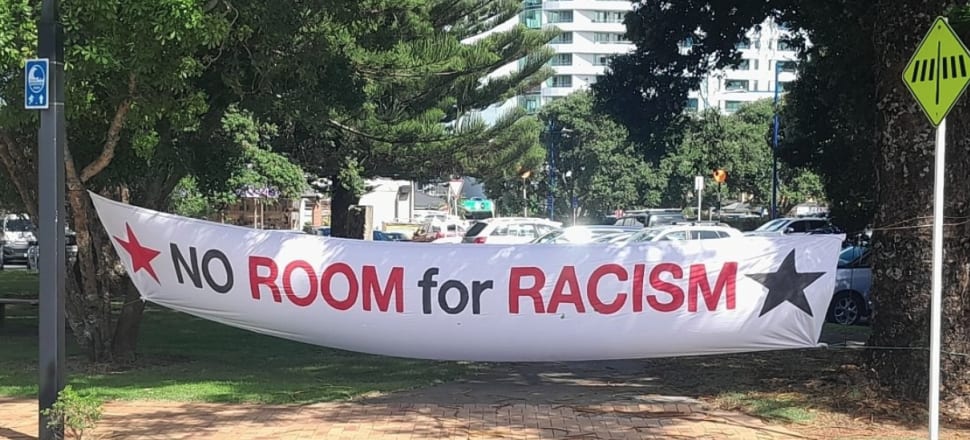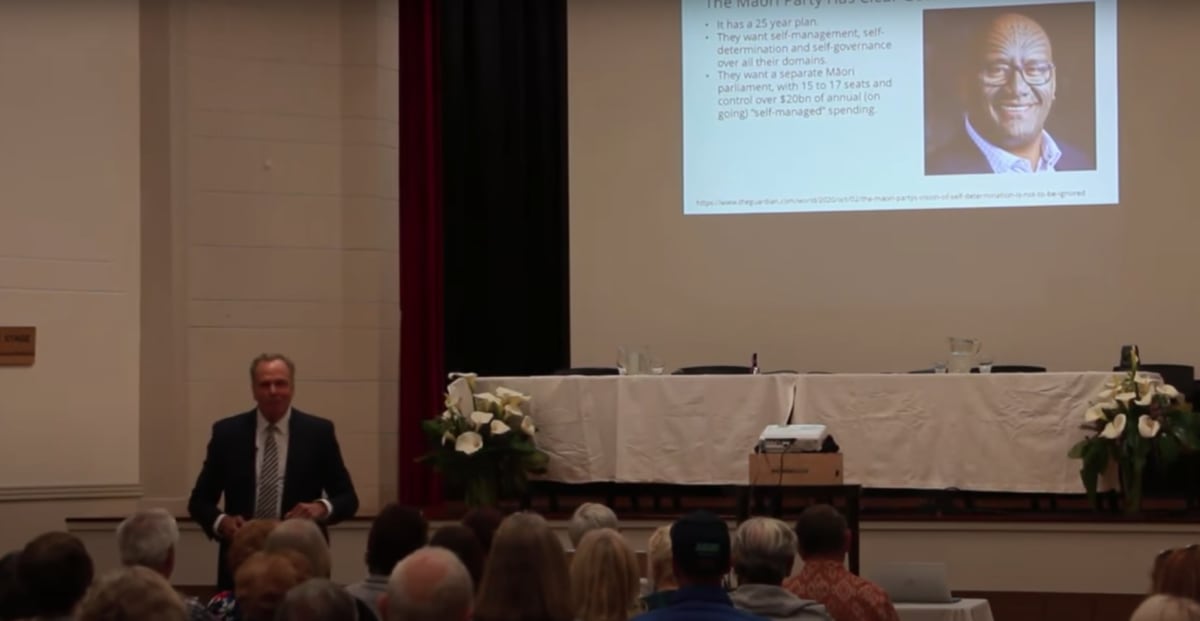
With a number of events planned down the length of the country, the scene at this weekend’s ‘Stop Co-Governance’ rally in Orewa could be just the first of many
Social media erupted with pictures of distorted faces, pulled into expressions of anger or yelling gleefully into the camera.
The mugshots of a mostly older and Pākehā crowd loudly opposing co-governance came from an event opposing co-governance in Orewa on Saturday.
READ MORE:
* Co-governance: It's nothing like you think
* Co-governance means rubbing out your line in the sand
The pictures and video have become prescient symbols of the harshly divided opinions on the policy, which would see a shared governance arrangement between Māori and non-Māori.
Not only do those photos depict the fury of a small amount of white New Zealanders, but they’ve also become a lightning rod for ire from those on the other side of the debate.
Public figures like Auckland Council independent Māori statutory board member Tau Henare were calling for names of one attendee who had a rather unflattering moment of rage plastered all over the media.
Henare called her “the face of white anger and misunderstanding” - and a trip down the woman’s Facebook timeline shows a belief that multiculturalism is destroying New Zealand.
The mid-proclamation moment was captured at a ‘Stop Co-Governance’ event held by evangelical preacher Julian Batchelor, where he said the co-governance issue sees New Zealand “at war” and called upon his crowd to join him in a march on Parliament before the election.
Batchelor has held a handful of meetings across Auckland and Northland in the past six months where he presses his crowds to oppose all “race-based legislation”.
However as the events have gone on and media coverage has increased, it seems the ratio of supporters to opponents has moved towards swinging out of his favour.
Footage of the weekend’s event in Orewa shows members of Ngāti Manuhiri and members of Te Herenga Waka o Ōrewa Marae attending in protest, blocked from Batchelor’s usual crowd by a line of police officers.
But what is Batchelor actually saying at these events that’s getting everybody so riled up?
The Batchelor sermon

Julian Batchelor presents his sermon to a crowd in Warkworth in September last year. Photo: Youtube
Julian Batchelor is a former school principal and real estate agent. In an interview from 2012 with Virtue Online, he said he found Christ as a student at Massey University in Palmerston North back in 1982, despite coming from a largely secular family.
Ten years after that, he quit his teaching job and started on his evangelical mission. Since then he's given sermons and written a book on spreading the word of his God.
It's not the first time he's leapt to war as a metaphor for his modus operandi - his 2006 book is called 'Evangelism: Strategies from Heaven in the War for Souls'.
Batchelor wrote that he was moved to write the book after studying The Book of Acts and finding Christians were much less likely to spread their religion in the present day.
"For 10 years, I became an investigative journalist, and over that time, slowly but surely, God revealed 67 reasons why this shift had occurred. And here is the thing - each of these reasons has to do with 2 Corinthians 2:10-11 and the devil's devices," he wrote.
As a preacher, he takes on the trappings of American televangelists like Billy Graham or Joel Osteen - think earpiece, suit, big crowds. That’s carried over to the co-governance meetings.
Like those American preachers, he's a good speaker, with a dynamic and engaging voice. He does crowd work like a stand-up comedian.
He encourages his crowds to get animated and worked up.
"I'm serious, I'd love you guys to get really wound up,” he told an audience in Warkworth last September. “The problem we have is Kiwis are too passive.”
However when it's the opposition that he's faced who are bringing their passion with them, he's been less than keen to see it.
Batchelor’s argument
Before shuffling out of the room, the crowds are asked to donate to the campaign and given some literature to distribute.
Among the latter is Batchelor’s own book - ‘Co-Governance - what it is, why it’s wrong, and why it must be stopped’. The book is a repackaging of many of the talking points he’s been making in his meetings, which roughly follow this format:
First he tells the audience that New Zealand is at war, and sets out the goals of Te Pāti Māori. Then he cites historian Stuart C Scott on the future of Treaty settlements, saying that they will go on “ad infinitum”.
Then citing the New Zealand Centre for Political Research he runs through how society would be affected by co-governance policies in spheres such as media, healthcare, justice, water rights and local government.
Next, he runs through the Treaty articles and compares them to how co-governance is playing out and could play out in future, before appealing to his audience to join him in a march through Wellington later in the year calling on whomever is next in government to repeal these policies.
His research relies heavily on the work of Stuart C Scott, particularly his 1995 work ‘The Travesty of Waitangi’.
It’s not the most solid of citations. A bit of research into Scott finds little apart from a handful of Amazon reviews for the out-of-print book and this from Richard S Hill’s ‘Māori and the State: Crown-Māori Relations in New Zealand/Aotearoa, 1950-2000’:
“Throughout the 1990s, in fact, media coverage of Waitangi Tribunal hearings and Treaty negotiations led to considerable anti-Treaty publicity, and a corpus of racist literature by authors such as Stuart C Scott became hugely popular in some quarters.”
The front cover for the book was designed by cartoonist Garrick Tremain, who was himself accused of racism following a satire of the measles epidemic in Samoa in 2019.
That last fact may be totally by the by, but Scott is still a bit of a cherry-pick.
Then there’s the New Zealand Centre for Political Research, which was founded by former ACT politician Dr Muriel Newman.
The think tank wears its political biases on their sleeve. It attracted controversy for running an advertisement in newspapers back in 2016 that used language like “There will be no end” and “Kiwis must act ... now!” with regard to Māori gaining water rights.
It’s clear that Batchelor’s facts all come from people who would be voting the same way as he.
But like so many of these kinds of arguments, much of it comes down to different interpretations of the Treaty of Waitangi.
Batchelor bases his arguments on the Littlewood Treaty Document, a version of the Treaty rediscovered in 1989 claimed to be the final English draft of the foundational document.
The Littlewood document uses the word sovereignty in the first article, while its second article says “the Queen of England confirms and guarantees to the chiefs and the tribes and to all the people of New Zealand, the possession of their lands, dwellings and all their property”.
Batchelor says pre-colonial notions of property should reframe how “possession” is understood, and suggests there is nothing in that document to say it was agreed that Māori have co-governance.
Nevertheless, the very translation he chooses to use does specify protected ownership of all Māori ownership of Māori property. How the history unfolded and how the wordings of different translations changes the meaning of the document allow for an interminable disagreement over interpretation.
The scenes of righteous anger at the roadshow have revealed just how politicised the issue has become.
But as Batchelor continues his tour, it will be telling whether or not attendees outnumber protesters or vice versa - it’s a ratio that may offer some foresight into the makeup of next year’s government.
The protests
Batchelor is happy for his own flock to be moved by the spirit, but he made it clear that Māori protesters interrupting his Dargaville show were not welcome.
When one protester during question time began his question in te reo Māori, Batchelor told him he couldn’t understand. Then as the audience member switched to English, Batchelor turned off his microphone.
Another earlier speaker was shut down as his question was “just woke”.
Batchelor reasoned that he’d booked out the halls, and if people wanted to raise the opposing viewpoint, they could book their own venue and have their own time at the pulpit.
In an interview with Sean Plunket yesterday morning, Batchelor said he'll hold further meetings as private functions, meaning he will be entitled to keep a bouncer on the door. It's an idea he said the police chief of Orewa had floated to him at the conclusion of last weekend's event.
Batchelor went so far as to compare his booked venues to marae in an interview with Plunket last week, and wondered if Māori speakers would interrupt in that setting.
Nevertheless, the meetings so far have largely occurred in public spaces. The Orewa meeting featured a sandwich board outside that said “All Welcome”. The events have been advertised widely - and perhaps most importantly, Batchelor has taken a stance that could not be firmer on the country’s most contentious issue.
If you pick up a political hot potato - well, it’s going to be hot.
Batchelor’s tour continues down country, with more than 40 meetings planned between Kerikeri and Queenstown.
Both the Orewa and an upcoming Mt Eden event have council-owned venues. It seems the bulk of the venues have yet to be publicly announced, but past hosts have included the Wellsford RSA and churches.
Batchelor lashed out at media reporting of his roadshow in his interview with Plunket, saying reports of violence at events up north had been greatly exaggerated in order to dissuade other venues from taking him on.
“They want to put the fear of God up all the people who have venues in New Zealand to not have us because it's dangerous and they want to shut down free speech,” he said.
However, video footage of the Dargaville meeting shows that as RNZ reported, police were present and disagreements between members of the audience were pretty constant through Batchelor’s allotted hour.
RNZ’s coverage did not describe any acts of violence.
Batchelor disputed that it was police who ended the event and asked people to disperse. The footage shows that Batchelor himself did indeed bring the event to a close, saying “We're sort of getting like it's the end of the night at the pub”, but an officer did then ask people to leave.
What remains undeniable is that the meetings have provoked great passion from both sides - for better or worse.







